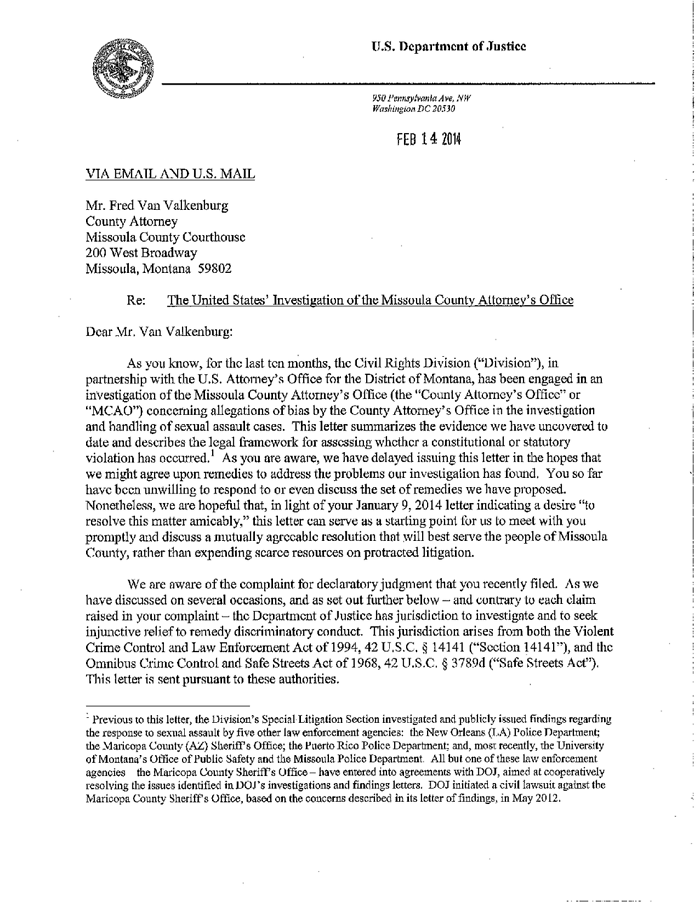
The Department of Justice said Friday it has "substantial evidence" that county prosecutors in Missoula, Mont., a city under investigation since May 2012 and known to many as America's "rape capital", discriminated against sexual assault victims on the basis of gender.
According to the DOJ, between January 2008 and May 2012, the Missoula Police Department recommended the Missoula County Attorney's Office prosecute 85 reports of sexual assault of adult women. But prosecutors only took action in 14 of the 85 cases.
"[Female] sexual assault victims in Missoula are deprived of fundamental legal protections and often re-victimized by MCAO's response to their reports of abuse," U.S. attorneys wrote in a findings letter to County Attorney Fred Van Valkenburg.
In the letter, Missoula prosecutors are accused of giving low priority to sexual assault cases — an "institutionalized indifference" that "perpetuates a culture that tolerates sexual assault, dissuades victims from reporting crimes, leaves violent criminal activity unaddressed, and compromises the safety of all women in Missoula."
In a statement to Mother Jones, Van Valkenburg said, "Everything the DOJ is saying about our office is false. These people are as unethical as any I have ever seen. They obviously have a political agenda they want to push and the truth does not matter to them."
Here are details of the Justice Department's allegations against the county attorney:
Prosecutors failed to communicate with victims about progress in their cases — even declining to even return victims' phone calls. The women were consistently treated with "indifference or disrespect."
Women consistently told us that Deputy County Attorneys treated them with indifference or disrespect … We learned that prosecutors did not communicate with female victims about the cases, did not inform them of the charges to be filed and did not seek their input about the type of relief to seek against the accused if convicted. In many cases, prosecutors failed even to return victims' phone calls.
One woman told us, for exampled, that she had no contact with the County Attorney's Office during the year after her first and only meeting with the prosecuting attorney handling her case. She only learned that the prosecutor had offered her assailant a plea agreement from an advocate with the Missoula Crime Victim Advocate Office, despite the fact that she and her mother had left numerous phone messages for the prosecuting attorney throughout the year … Her advice to other women reporting sexual assault in Missoula, she said, would be "if at all possible, not to go" to the County Attorney's Office.
Prosecutors "lack sufficient training" and are encouraged to pursue sexual assault cases only in their "spare time."
MCAO attorneys lack sufficient training in the bodies of legal and scientific knowledge necessary to prosecute assaults against adult women, including non-stranger sexual assault. While Deputy County Attorneys have attended trainings concerning domestic violence and the sexual abuse of children, our investigation indicates that until recently, they received no training on sexual assault.
[In] responding to questions about delays in charging decisions, you reportedly said that your attorneys review charging decisions in sexual assault cases "when they have spare time."
Victims described the prosecutors as having "no compassion" and working with them "traumatic." Some women were read religious passages. Others were told "boys will be boys."
In one instance, for example, a Deputy County Attorney quoted religious passages to a woman who had reported a sexual assault, in a way that the victim interpreted to mean that the Deputy County Attorney was judging her negatively for having made the report.
We also spoke to a woman whose daughter was sexually assaulted, at the age of five, by an adolescent boy. In response to a question about why the perpetrator had been sentenced to only two years of community service, the prosecutor handling the case reportedly told the woman that "boys will be boys." Advocates told us that Deputy County Attorneys "said terrible things to victims," including saying to one woman, in the course of discussion the decision not to prosecute her sexual assault, "All you want is revenge."
One woman described her interaction with a Deputy County Attorney as "traumatic." Another woman stated that, by the time the prosecution was over, she was so frustrated by the Deputy County Attorney's treatment and the MCAO's failure to keep her informed about key developments in the case that she "would never suggest" that another woman pursue a sexual assault prosecution in Missoula. She said further that it "broke her heart" that other women had to go through a similar process to have their cases prosecuted. Other women repaired that prosecutors treated them with "no compassion," and acted like the prosecutors were "forced to speak" with them. Several women informed us that they left meetings with prosecutors feeling like they were being "judged" for their prior sexual history, or that the prosecutors did not believe them.
One woman said prosecutors dropped her case "because of her sexual history."
[Under] Montana law, the sexual history of a woman is legally protected from introduction at trial in sexual assault cases in all but the most limited circumstances. Yet one woman informed us that the County Attorney's Office stated that MCAO had declined to prosecute her case because of her sexual history. Basic prosecutorial decisions on women's sexual histories not only demoralizes and stigmatizes victims, it disregards laws and national prosecutorial standards designed to sexual assault prosecution and protect women who report assaults.
Despite Missoula's "significant" population of transients and people with mental health issues, prosecutors threw out nearly every case involving a disabled woman.
[The] County Attorney's Office declined to prosecute nearly every case of non-stranger sexual assault involving a woman who had a mental or physical disability, even in cases where there was evidence such as a confession or incriminating statements by the perpetrator … Local advocates report that Missoula is one of Montana's principal locations for services for persons with mental health issues, including a significant transient population.
In another case, the Missoula Police obtained incriminating statements from a suspect who admitted to having intercourse with a mentally ill woman, including statements that he couldn't "determine" how soon he stopped having sex with the woman after she asked him to stop and told him he was causing her "vagina" to "hurt." The Missoula Police referred the case to the County Attorney's Office, recommending that the prosecutor charge the suspect with sexual intercourse without consent. Despite the incriminating statements, the County Attorney's Office declined to bring any charges.
They also declined to prosecute "nearly every case" involving an inebriated victim, including one case in which police had actual video footage of a woman being drugged before her rape. Prosecutors cited "insufficient evidence."
[We] found that the County Attorney's Office declined to prosecute nearly every case of non-stranger assault involving an adult woman victim who was, at the time of the assault, subject to some type of heightened vulnerability — for example, in cases where the assault was facilitated by drugs or alcohol."
[A] woman reported that she had been drugged and raped by an acquaintance the previous day. Missoula Police officers developed evidence that included video footage of the alleged assailant slipping something into the woman's drink. The Missoula Police also obtained admissions by the assailant that although he did not remember putting something in the woman's drink, it was possible he had and, as he stated, "If I were trying to make her relax it would be Xanax" When confronted with the video footage, the assailant also stated, "My memory tells me no, but I can't argue with surveillance." The Missoula Police obtained a search warrant for the suspect's home and learned that the suspect had recently refilled prescriptions for two drugs common in drug-facilitated sexual assaults, including Xanax. Nonetheless, MCAO declined to charge the case, citing insufficient evidence, but with no documented further explanation.
Case after case was given the "insufficient evidence" treatment — even when the assailant had confessed.
In one case, for example, the Missoula Police obtained a confession from a man who admitted raping a woman while she was unconscious. The Missoula Police referred the case to the County Attorney's Office with a recommendation that the prosecutor charge the suspect with sexual intercourse without consent, as well as car theft. The County Attorney's Office declined to bring any charges, citing "insufficient evidence."
The prosecutors' attitude has taught Missoula Police detectives that a case "must involve physical force of overwhelming and irrefutable evidence to be considered a crime worthy of prosecution."
The work of Missoula Police detectives is compromised by that fact that, even if they expend the resources to conduct a comprehensive investigation, the County Attorney's Office often will not charge the case. One woman reported that the Missoula Police detective in her case informed her that because "no one had a limb cut off and there was no video of the incident," prosecutors "wouldn't see this [the rape] as anything more than a girl getting drunk at a party."
Whether or not the detective's characterization was accurate, the County Attorney's actions over time left this detective — and many others like him — with the understanding that non-stranger sexual assault of women, and especially drug-facilitated sexual assault, must involve physical force of overwhelming and irrefutable evidence to be considered a crime worthy of prosecution.
And victims have been taught that reporting their assaults is "at best, a waste of time, or at worst, a re-victimization."
For victims of sexual assault, MCAO's response indicated that a decision to report and participate in an assault investigation will be, at best, a waste of time, or, at worst, a re-victimization. Indeed, in one case from early 2013, a detective told both the victim and the offender that the detective's role was limited to collecting physical evidence of sexual assault at that the County Attorney's Office would never file charges in the case — despite the fact that the detective acknowledged to the victim that she had been raped by the offender.
For instance, we interviewed a young woman who had suffered a gang rape as a student at the University of Montana and described feeling re-traumatized by the experience of seeking to have the assault prosecuted by the County Attorney's Office. As a result of hearing about that experience, a friend of the woman declined to report her own rape to either the police or to prosecutors.
In another example, a clinical psychologist told us that she had counseled numerous sexual assault survivors in Missoula who had pursued criminal charges against their assailants and described their experience with the County Attorney's Office as being so horrendous that, when the psychologist herself was sexually assaulted, she was reluctant to have her case prosecuted by the County Attorney's Office.

